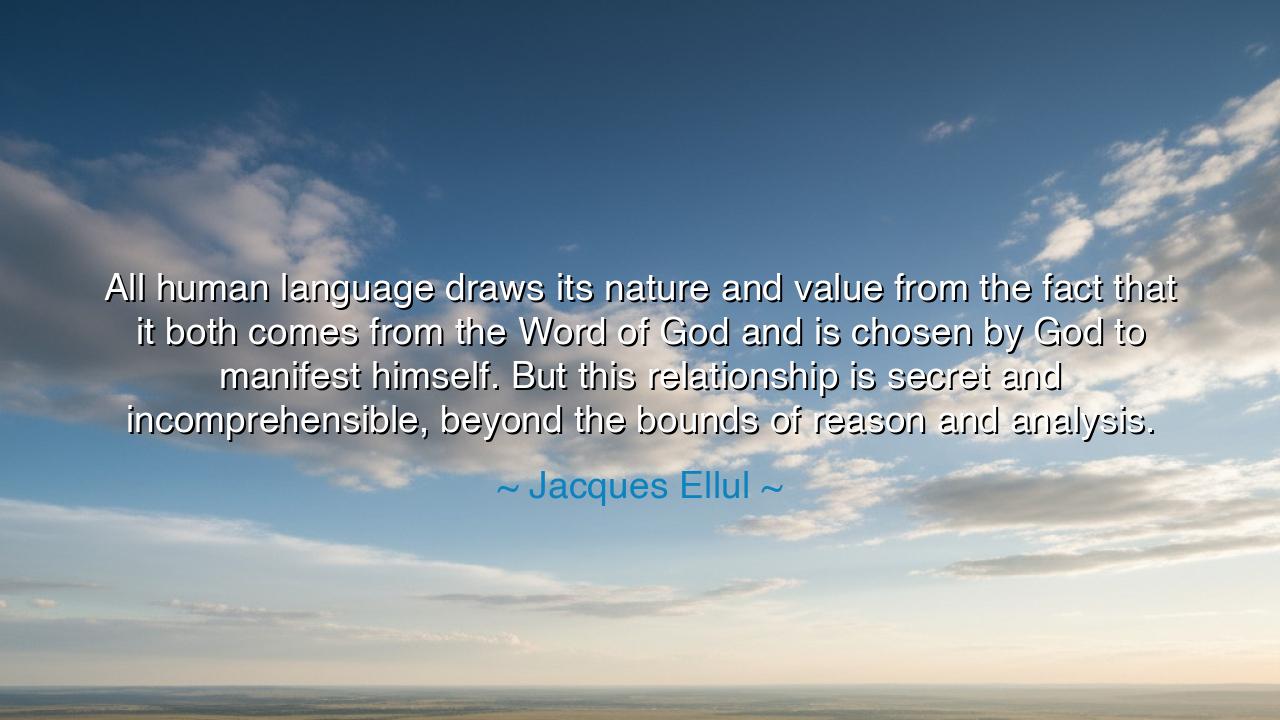
All human language draws its nature and value from the fact that
All human language draws its nature and value from the fact that it both comes from the Word of God and is chosen by God to manifest himself. But this relationship is secret and incomprehensible, beyond the bounds of reason and analysis.






Jacques Ellul, the French thinker whose mind often probed the mysteries where theology and society entwine, once declared: “All human language draws its nature and value from the fact that it both comes from the Word of God and is chosen by God to manifest himself. But this relationship is secret and incomprehensible, beyond the bounds of reason and analysis.” These words carry the force of revelation, summoning us to consider that our speech, our stories, even our simplest words are not mere human inventions but reflections of a divine origin that transcends comprehension.
The meaning of this statement rests upon the belief that language is sacred. Ellul does not see words as random symbols created for convenience, but as streams flowing from the eternal Word of God, the Logos that spoke creation into being. To speak, then, is not simply to communicate; it is to participate in the mystery of manifestation. In our voices, in our stories, even in our debates and songs, there lingers a spark of the divine. Yet this mystery is veiled — beyond the reach of mere analysis or reason — for the bond between God and language lies deeper than logic.
The origin of this idea reaches back to ancient traditions. In the opening of the Gospel of John, it is written: “In the beginning was the Word, and the Word was with God, and the Word was God.” For early Christians, this meant that the universe itself was spoken into being by God, that creation was a kind of utterance. The Hebrew Scriptures, too, show the power of words: God said, “Let there be light,” and light was. Words were not decorations; they were power, creation, and life. Ellul stands in this lineage, reminding us that human speech is valuable because it shares in this divine origin.
History gives us examples of how words, though fragile, hold divine power. Consider Martin Luther King Jr. on the steps of the Lincoln Memorial. His speech, “I Have a Dream,” was not just rhetoric. It carried a force that moved a nation, echoing like prophecy, awakening hearts, shaping destiny. Or recall Abraham Lincoln’s Gettysburg Address, a speech of barely 270 words, yet containing within it the weight of sacrifice and the renewal of a people. These moments remind us that when language aligns with truth, it reveals something greater than human will — it unveils a glimpse of the eternal.
Yet Ellul warns us also: this relationship between God and language is secret and incomprehensible. It cannot be dissected like a machine. Linguists may analyze grammar, philosophers may debate meaning, but the essence of why words have power, why they can wound or heal, destroy or restore, lies hidden in mystery. To believe that language comes from God is to live with reverence toward speech, recognizing that every word carries a weight far beyond its syllables.
The lesson for future generations is profound: guard your words as sacred gifts. Do not speak carelessly, for words can shape souls and alter destinies. Speak with truth, with kindness, with reverence, knowing that in your utterance you echo the Word that called forth the world. At the same time, do not imagine that you can fully grasp this mystery. Approach it with humility, understanding that some truths lie beyond the reach of reason.
Practical action must follow. Choose words that build, not destroy. Honor the power of language in your prayers, your teaching, your art, and your daily conversations. Listen with reverence to the voices of others, for they too carry echoes of the divine Word. And when you are tempted to dismiss language as common or empty, remember Ellul’s teaching: that every word, even the simplest, bears a secret connection to God, hidden yet real, incomprehensible yet undeniable.
Thus, Jacques Ellul’s reflection becomes a timeless teaching. Human language is not merely a tool of survival but a mystery of divine origin. It comes from God, it manifests God, and yet it remains beyond analysis. To live by this truth is to treat words as sacred, to speak with reverence, and to listen with awe. For in our speech, the eternal whispers, and in our silence, the mystery remains.






AAdministratorAdministrator
Welcome, honored guests. Please leave a comment, we will respond soon